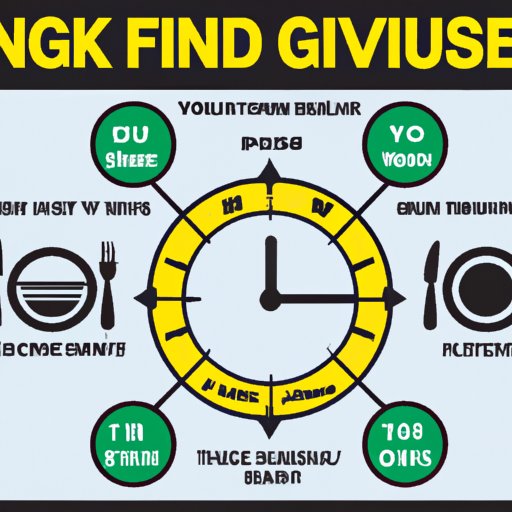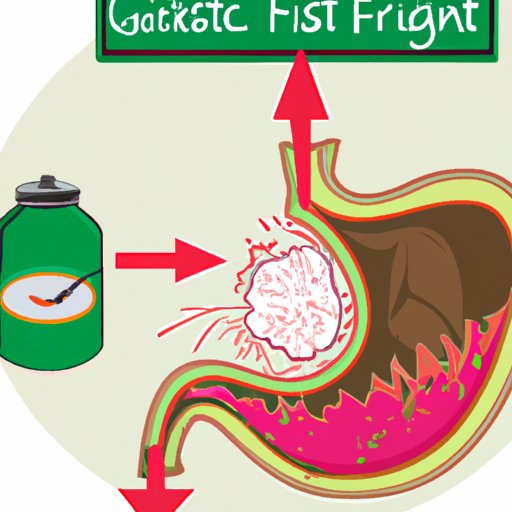Introduction
After eating a meal, it’s natural to want to know how long it will take for your stomach to empty. Gastric emptying is the process of food leaving the stomach and entering the small intestine for digestion. Understanding the science behind how long it takes for food to digest can help you make informed decisions about when and what to eat.
Exploring the Science Behind How Long it Takes for Food to Digest
The anatomy of the stomach plays an important role in gastric emptying. The stomach is made up of four layers: the mucosa, submucosa, muscularis, and serosa. The mucosa is the innermost layer and contains glands that secrete digestive enzymes. These enzymes are responsible for breaking down proteins, carbohydrates, and fats. The muscularis is composed of smooth muscle fibers that help churn food and move it through the digestive tract. Finally, the serosa is the outermost layer and helps protect the stomach from infection or damage.
Hormones also play an important role in gastric emptying. The hormone gastrin is released in response to food and stimulates the production of stomach acid. Gastrin also increases the contractions of the muscularis, which helps move food through the stomach and into the small intestine. In addition, the hormone cholecystokinin (CCK) is released in response to fat and protein and slows the rate of gastric emptying. This allows more time for nutrient absorption.
What Factors Affect the Rate of Gastric Emptying?
There are several factors that can affect the rate of gastric emptying. The type of food consumed can have an impact on how quickly food passes through the stomach. For example, high-fat foods require more work from the digestive system and therefore take longer to digest. Similarly, larger portions of food require more work from the digestive system and therefore take longer to digest than smaller portions.
Certain medications can also affect gastric emptying. For example, proton pump inhibitors (PPIs) can reduce the amount of acid produced in the stomach, which can slow down the rate of gastric emptying. Likewise, certain illnesses such as diabetes can affect the rate of gastric emptying. Lastly, stress can cause the body to produce hormones that can slow down the rate of gastric emptying.

A Guide to Knowing How Long it Takes for Your Stomach to Empty After Eating
It’s important to note that everyone’s gastric emptying time is different. However, there are some general guidelines to keep in mind when it comes to knowing how long it takes for your stomach to empty after eating. Here are some tips:
- Timing Meals and Snacks: Aim to eat meals and snacks at regular intervals throughout the day. This will help ensure that your stomach has enough time to empty before your next meal or snack is due.
- Eating Smaller Portions: Eating smaller portions of food will help ensure that your stomach has enough time to empty before your next meal or snack is due.
- Avoiding High-Fat Foods: High-fat foods take longer for the body to break down and digest, so aim to limit your intake of these types of foods. Instead, focus on consuming lean proteins, fruits, vegetables, and whole grains.
- Avoiding Sugary Drinks: Sugary drinks can cause blood sugar levels to spike and crash, leading to fatigue and hunger cravings. Avoiding sugary drinks can help regulate blood sugar levels and ensure that your stomach has enough time to empty before your next meal or snack is due.

Strategies to Help Speed Up Gastric Emptying After Meals
If you find that your stomach isn’t emptying as quickly as you’d like, there are some strategies you can use to help speed up the process. Here are some tips:
- Eat Slowly: Eating slowly can help give your stomach enough time to signal to your brain that it’s full. This can help prevent overeating and ensure that your stomach has enough time to empty before your next meal or snack is due.
- Stay Hydrated: Staying hydrated is important for overall health, but it can also help with gastric emptying. Drinking water or other fluids can help move food through the digestive system more quickly.
- Take a Walk: Taking a short walk after eating can help stimulate the digestive system and encourage gastric emptying.
- Consider Supplements: Certain supplements, such as probiotics, can help promote gut health and improve digestion. Talk to your doctor to see if taking a supplement could be beneficial for you.
Conclusion
Gastric emptying is the process of food leaving the stomach and entering the small intestine for digestion. Everyone’s gastric emptying time is different, but there are some general guidelines to keep in mind. Timing meals and snacks, eating smaller portions, avoiding high-fat foods, and avoiding sugary drinks can all help ensure that your stomach has enough time to empty before your next meal or snack is due. Additionally, eating slowly, staying hydrated, taking a walk, and considering supplements can help speed up the process. By understanding the science behind how long it takes for food to digest, you can make informed decisions about when and what to eat.
(Note: Is this article not meeting your expectations? Do you have knowledge or insights to share? Unlock new opportunities and expand your reach by joining our authors team. Click Registration to join us and share your expertise with our readers.)
